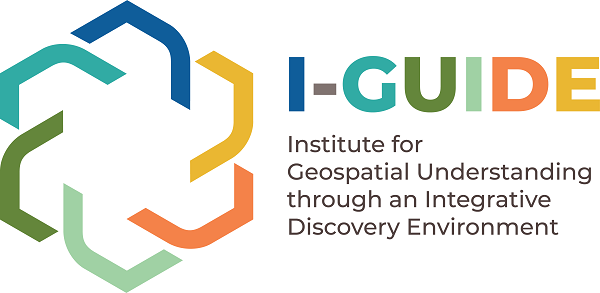- Home
- About UCGIS
- News and Stories
- Community
- Programs & Projects
- TRELIS
- Symposia
- Summer Schools
- Webinars & Workshops
- Instructional Resources
- GIS&T Body of Knowledge
- I-GUIDE
- Completed Projects
- Join
UCGIS I-GUIDE Community Champions, 2023-24Our Call for Proposals is now open!As part of this unique research experience, Community Champions support the expansion of I-GUIDE topics and concepts into the broader geospatial and convergence science community. Each Champion proposes to work on a small-scale project of their own design that aligns with the annual theme and through their work are able to participate directly with I-GUIDE's activities, outreach initiatives, and real-world impacts. To recognize the valuable contributions and dedicated involvement of the Community Champions, the program offers an honorarium of $3,000 for each cohort member.
2023-2024 Community Champions ThemeThis year, the Community Champions will contribute to refining, enhancing, and applying the I-GUIDE Convergence Curriculum for Geospatial Data Science. The Convergence Curriculum for Geospatial Data Science is a flexible and integrative educational framework designed to help students, scholars, and professionals tackle complex real-world problems. It focuses on building foundational knowledge through five key threads: ethics, analytics, geospatial concepts, computing, and visualization. As individuals progress through the curriculum, they integrate skills and knowledge through culminating in a convergence of competencies and domain expertise. The curriculum offers various depth levels, allowing customization for different learning needs, and is continuously refined based on community feedback and evaluation, with new content releases planned for 2023. Call for ProposalsWe invite proposals from mid- to late-career scholars and educators with experience with diverse convergent issues within geospatial data science. We welcome diverse perspectives from individuals, groups, and institutions, aiming to enhance our Convergence Curriculum program. The Community Champions will play a crucial role in refining our curriculum materials, applying innovative solutions and supporting the improvement of the Convergence Curriculum program.. More broadly, your contributions will support the advancement of geospatial data science education and help ensure its continued effectiveness. Together, we can shape the future of geospatial data education and empower the next generation of scientists. To be considered for this opportunity, complete a brief online application that will be reviewed by the I-GUIDE and UCGIS Executive Committees. You will be asked to relate your background, expertise, and interests to the 2023-2024 focus area, as well as your ideas for disseminating I-GUIDE's educational products and knowledge. You'll also need to provide a 2-page, NSF-style biosketch. Ready to apply? You can access the online form here. Eligibility Requirements
Application Timeline
Project ProposalAs part of the application process, applicants are asked to propose a project to be completed over the course of the following year. Some examples of possible projects or project components are given below. However, applicants are not limited to proposals within the scope examples listed below.
Additional InformationView the links below for information on previous Community Champions cohorts:
Please reach out to Kate Vavra-Musser ([email protected]) or Eric Shook ([email protected]) with any questions or comments regarding the application process or Community Champions program. |

